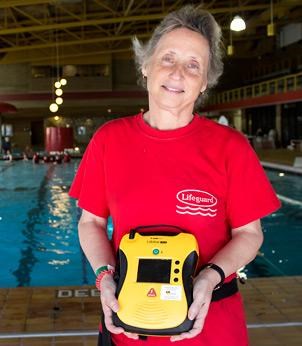Six life-saving devices are being installed at Powell River Recreation Complex as part of national campaign to increase the number of cardiac arrest survivors across the country.
According to the Heart and Stroke Foundation, approximately 40,000 Canadians experience sudden cardiac arrest each year, with the majority occurring at home or in public places.
The complex will receive six automated external defibrillators (AEDs), to add to the three already installed, from the heart and stroke foundation.
Neil Pukesh, recreation manager at the complex said they applied for the grant to increase the number of units available at the facility.
“It’s always nice to know you’ve got some kind of safeguard in the building should you need it,” said Pukesh. There have been a number of stories recently from the Lower Mainland and Vancouver Island, he said, of people of various ages surviving cardiac arrest events because the mobile devices were used to restart their heart.
Cardiac arrest, when the heart stops pumping because blood flow to it has been restricted or cut off, can happen both with or without warning. Sometimes it is preceded by symptoms such as fainting, fatigue, blackouts, dizziness, chest pain, shortness of breath, weakness, and vomiting. Sometimes the arrest may happen without any warning.
Corey Martin is the recreation complex’s aquatic program coordinator. She said the six new units add to the existing three which were installed in 2009 and came from community donations.
“We haven’t had to deploy them since we got them, but we have had them beside the patient ready to use,” said Martin.
The additional units will provide expanded coverage in the facility and cut down on the amount of time it takes to run and bring the portable unit back to a person who is displaying signs of cardiac arrest.
“A quick response is essential to saving lives,” said Martin.
For every minute that passes without help, a person’s chance of surviving a cardiac arrest drops by seven to 10 per cent. However, cardiopulmonary resuscitation (CPR) with the use of an AED before the arrival of emergency medical first responders can double the chance of survival.
Four of the six new units will be installed on the lower level at the complex, and the other two upstairs, one near the Kings’ office area and the other in the concourse so it can be used by spectators in the theatre. “We’re trying to make them as accessible as possible,” said Martin. On the lower level, one will be located beside the fitness room, one closer to the pool and a couple near the arenas, she added.
“We think the original places were good, but this just gives better coverage,” she said.
Over 50 people, including complex staff and people representing the facility’s major user groups attended a training session with the AEDs recently, Pukesh said, adding that the AEDs are very straightforward to use and once turned on talk the person giving first aid through its set up and use.
There were four deaths in the complex prior to the installation of the devices in 2009, all due to heart related issues, Martin said.



